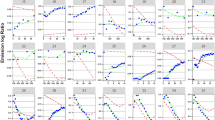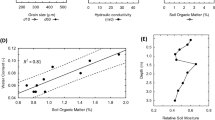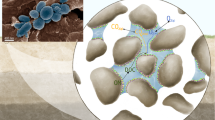Abstract
METHODS SO far used for studying the evolution of carbon dioxide resulting from the decomposition of soil organic matter1, although satisfactory for periods of 24 hr. or more, do not permit measurements for shorter periods, which may be important in studying the immediate effects of soil treatments.
This is a preview of subscription content, access via your institution
Access options
Subscribe to this journal
Receive 51 print issues and online access
$199.00 per year
only $3.90 per issue
Buy this article
- Purchase on Springer Link
- Instant access to full article PDF
Prices may be subject to local taxes which are calculated during checkout
Similar content being viewed by others
References
Waksman and Starkey, Soil Sci., 17, 141 (1924). Jensen, Proc. Linn. Soc., N.S.W., 61, 22 (1936). Vandecaveye and Katznelson, Soil Sci., 46, 139 (1938).
Quastel and Webley, J. Agric. Sci., 37, 257 (1947). Ellinger and Quastel, Biochem. J., 42, 214 (1948).
Webley, J. Agric. Sci., 37, 249 (1947).
Author information
Authors and Affiliations
Rights and permissions
About this article
Cite this article
ROVIRA, A. Use of the Warburg Apparatus in Soil Metabolism Studies. Nature 172, 29–30 (1953). https://doi.org/10.1038/172029b0
Issue Date:
DOI: https://doi.org/10.1038/172029b0
This article is cited by
-
Soil Water Availability Influences P Pools in the Detritusphere of Crop Residues with Different C/P Ratios
Journal of Soil Science and Plant Nutrition (2019)
-
Wireworm damage reduction in potatoes with an attract-and-kill strategy using Metarhizium brunneum
Journal of Pest Science (2017)
-
Inverse determination of heterotrophic soil respiration response to temperature and water content under field conditions
Biogeochemistry (2012)
-
Development of soil microbiology methods: from respirometry to molecular approaches
Journal of Industrial Microbiology & Biotechnology (2010)
-
Influence of moisture and aeration on oxygen uptakes in Warburg respiratory experiments with litter and soil
Plant and Soil (1970)
Comments
By submitting a comment you agree to abide by our Terms and Community Guidelines. If you find something abusive or that does not comply with our terms or guidelines please flag it as inappropriate.



